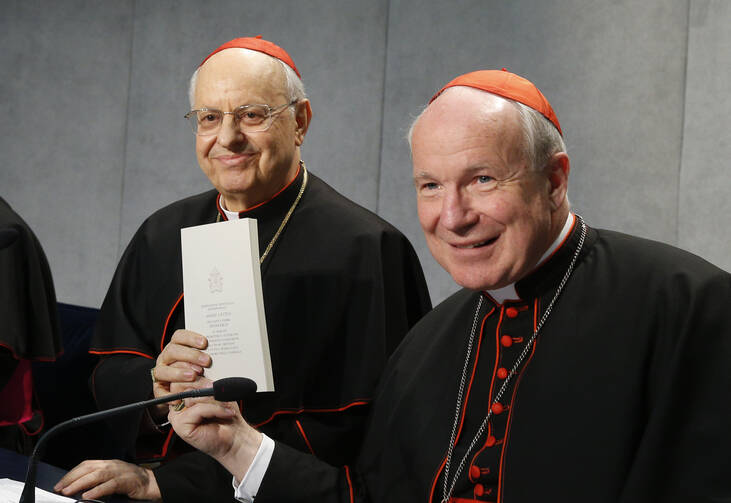Pope Francis' outreach to divorced and civilly remarried Catholics opens the door to letting them receive Communion, Germany's bishops declared Wednesday.
In a statement, the German bishops' conference said a document by Francis entitled "The Joy of Love" sets out how pastors can provide "differentiated solutions" to individual cases through a process of accompaniment. That process "opens the possibility of receiving the sacraments of reconciliation and the Eucharist," the bishops' statement said.
Argentine and Maltese bishops already have issued similar guidelines based on Francis' divisive 2016 document, which was the fruit of a two-year canvassing of church leaders during two Vatican meetings, or synods, of bishops.
The Maltese bishops have gone even further than the pope, saying the Eucharist cannot be denied to civilly remarried or divorced Catholics if, after a path of spiritual discernment, they are at peace with God.
The German bishops' statement isn't surprising given that they led the progressive wing during the synods, pushing for a case-by-case allowance for these Catholics. However, not all German leaders back the conference interpretation.
Francis' own doctrinal czar, German Cardinal Gerhard Mueller, said church doctrine prevents Catholics who divorced and remarried outside the church from receiving Communion unless they abstain from sex.
"It cannot be said that there are circumstances according to which an act of adultery does not constitute a mortal sin," Mueller said in an interview with Italian publication "Il Timone." ''For Catholic doctrine, it is impossible for mortal sin to coexist with sanctifying grace" necessary to receive Communion.
He further admonished bishops for trying to interpret the pope, saying they should first know their doctrine.
"The bishop, as teacher of the word, must himself be the first to be well-formed so as not to fall into the risk of the blind leading the blind," Mueller said.
Church teaching holds that unless divorced Catholics receive an annulment, or a church decree that their first marriage was invalid, they are committing adultery and cannot receive Communion. For a variety of reasons, such annulments often cannot be obtained.
Citing Jesus' teaching on the indissolubility of marriage, some Catholics insist the rules are fixed and that the only way these Catholics can receive Communion is to abstain from sex. Progressives sought wiggle room to balance doctrine with mercy by looking at couples on a case-by-case basis.
In his document, Francis said pastors should help individual Catholics ascertain what God is asking of them. Using vague language and footnotes, he linked such discussions of conscience with access to the sacraments. He has said the Argentine interpretation of his document is the only one, while the Vatican newspaper published the Maltese guidelines in a sign of endorsement.
Backing Mueller is the archbishop of Philadelphia, who issued guidelines for his archdioceses saying civilly remarried Catholics can only receive Communion if they live as brother and sister.
Moulson reported from Berlin.
Copyright 2017 The Associated Press. All rights reserved. This material may not be published, broadcast, rewritten or redistributed.












What we are witnessing is not a surprise as the German Bishops are now following the decisions of other bishops such as Bishop McElroy of San Diego and the Argentina Bishops. In the coming months we will see Bishops from other countries declare that under certain circumstances divorced and remarried Catholics can receive Holy Communion without an annulment.
These bishops and Conferences of Bishops are interpreting Amoris Laetitia (AL) in the spirit in which Pope Francis wrote it and in which Cardinal Schonborn, the Vatican's official interpreter of AL, also support. Keep in mind that Pope Francis has already approved of the guidelines issued by the Argentina bishops and said there is no other correct interpretation.
This brings us to the issue of the profound division among the Bishops on this issue. Pope Francis is making it clear that there can exist a doctrine on marriage (the Law) and a practical and pastoral application of it (the Spirit of the Law) without contradiction. In this case, AL is being applied to those who made a mistake, got divorced, entered into a successful second marriage, want to express true contrition and repentance, have a sincere desire to come back to the Church, but are in a moral dilemma.
As Cardinal Schonborn said, in paraphrase, AL changed nothing, but it also changed everything. It is my hope and prayer that the spirit of AL might be applied in the future to other controversial moral issues in accordance with the love, mercy and spirit of Christ Jesus.
I am glad to see this. I think we need to remember that Jesus did not exclude Judas Iscariot from sharing at the Last Supper.